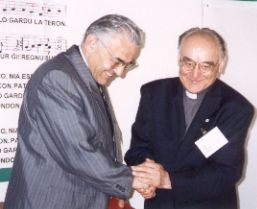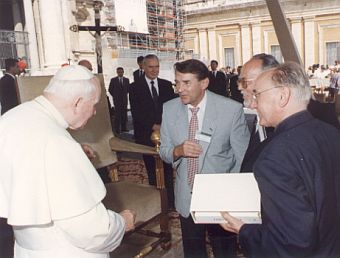ESPERANTO THE INTERNATIONAL LANGUAGEAT THE SERVICE OF CHRISTIANS AND THE CHURCH |
||||||
|
The results of language difference can range from lack of understanding to downright hatred, especially if it is mis-used in order to whip up nationalistic fervour. The rule of the powerful over the weak was often accompanied by the tendency to impose the language of the rulers on their subjects. From earliest times the dictum, "One must accept the tongue of whosoever rules the empire" has been valid. This resul-ted in a certain discrimination against and suppression of the rights and identities of small nations, particularly and sometimes led to their complete assimilation. In todaýs world, linguistic domination has a more subtle form because it is driven,above all, by economic interests and supported by modern technology. Present day globalisation is clearly accompanied, linguistically, by gradual Anglicisation on a worldwide scale. The acceptance of any national lan-guage as a lingua franca inevitably involves discrimination against some. History has shown that human society needs an international auxiliary lan-guage. It ought to be, of course, truly neutral and easy to learn so that communication can take place on the basis of equality. Over the last two hundred years an awareness of this constant need gave rise to an array of planned languages. Of them all, only one has stood the test of time; it is called Esperanto. The author of Esperanto was a Polish eye doctor, Ludwig L. Zamenhof (1859-1917). This international language came into being thanks to his profound conviction that the world needed a simple, comprehensible and completely neutral means of mutual understanding which would break down barriers, do away with discrimination and which, at the same time, would be easily accessible to all peoples. Soon after its creation many Christians recognised the signi-ficance of this magnanimous project and accepted it.
IKUE's President, Fr Duilio Magnani, thanks Cardinal Miloslav Vlk for accepting his appointment as Patron of IKUE during the Union's 48th Congress in Olomouc (1995)It is indisputable that Esperanto is a linguistic work of genius. It is based on logical principles, has phonetic spelling, uses internationally known word roots, cleverly creates and derives vocabu-lary yet, all the while, its grammar is quite simple. Furthermore, it remains open to the acceptance of new terms and to continuous development. At present, this planned language is used successfully on every continent, it has a rich literature, both original and trans-lated (more than 40,000 titles) and magazines, compact disks and videos are published in it. This is definite proof of its vitality and usefulness. However, because it is not directly linked to any nation, state or interest group it is at a disadvantage compared with other languages, the promotion and teaching of which receive enormous financial support. Esperanto, then, is in an une-qual position for it is not supported or accepted by any political or economic |
Representatives of IKUE give Pope John II a Missal in Esperanto during an audience on 3 September 1997 in RomeEsperanto succesfully does away with language barriers between human beings, builds bridges of understanding and leads to friendship between races and nations. Here, then, is the basic difference compared to the use of national languages. Moreover, it obviates the need for long and difficult language study and expensive systems of interpretation and translation. It is possible to demonstrate that Esperanto can be learned about six times more quickly than any other foreign language. In practice this means that after a yeaŕs study the average student can acquire the same linguistic competence which would require six years of study in other languages. Unfortunately, the general public has not been made sufficiently aware of this and so the great advantages of Esperanto are not too widely known. Zamenhof´s creation however, is not just a unique
means of communication. His ideas have a more pro-found significance;
through the language, Esperantists strive for the brotherhood of Man
based on shared ideals. Everyone who uses it is part of one huge family
all over the world.
The Church, which is universal and therefore not
directly linked to any nation or language, used Latin as its official
common language up to the time of the Second Vatican Council. Its
advantage was that, as a dead language, it was essentially neutral. In
theory, this is still the situation but in practice Latin no longer
truly functions in this capacity. The reasons are clear. The greatest
obstacle to the widespread use of Latin is its complexity and lack of
potential for development. The gap left by the loss of Latin has been
filled in various ways. Vatican institutions generally use Italian along
with many translations but during synods and other inter-national
meetings participants are usually divided into language groups in which
preference is given to the so called world languages. It is well known
that such a procedure causes difficulties especially for participants
from smaller nations. This system is not only impractical but
disadvantageous for some of our brothers and sisters in faith. Let us
openly admit that not only priests but also bishops are incapable of
understanding one another. Regarding such complications nothing is said.
The community of God́s people, therefore,
urgently needs a common language for international commu-nication which
would be easily accessible to all its members. If the Church is indeed
universal (and none of her members doubts that) then in Esperanto she
has at her disposal a unique language resource for both internal and
external use. Within the Esperanto-speaking community Christians make up a special group because apart from the ideas outlined above they work for the spread of the Gospel message throughout the world by means of this international language. The International Union of Catholic Esperantists (Internacia Katolika Unuiĝo Esperantista - IKUE) has a headquarters in Rome and cooperates with the Universal Esperanto Association (UEA). The chief patron of IKUE is cardinal Miloslav Vlk, former president of the European Bishopś Conferences. Heavenly patrons are: The Blessed Virgin Mary, St. Pius X, St. Maximilian Kolbe and Blessed Titus Brandsma. IKUE has been officially recognised by the Papal Council for the Laity as an international association of Catholic Faithful by decree no. 196/92JS-61 /B-25 on 11/02/1992. IKUE a worldwide organisation, was founded in 1910 but the magazine Espero Katolika (Catholic Hope) had been in existence from 1903. Similarly non-Catholic Christians come together through The International League of Christian Esperantists (Kristana Esperantista Ligo Internacia - KELI). They publish the magazine Dia Regno (Divine Kingdom) and IKUE has close ecumenical links with them.
|
Esperanto has been officially included among the
liturgical languages of the Catholic Church. Approval for this was given
by the Vatican Congregation for Liturgy and the Sacraments on 08/11/1990
by protocol no.CD 81/89. Delegates of I.K.U.E. presented an official
Missal to the Holy Father in 1997 (see photograph). Similarly, during
ecumenical encounters a com-mon service book for all Christians is used
which includes sevices, prayers and hymns in Esperanto. Its title is
"Adoru" (Adore). The Bible has also been translated into the International Language. The Old Testament was the first literary work published in Esperanto in a translation by Zamenhof himself. Pope Pius X gave his Apostolic Blessing to the first congress of Catholic Esperantists in 1910 which ended with the words, "Esperanto has a great future". His Holiness Pope John Paul II was in favour of that language too. In his 1994 multilingual festive address “Urbi et Orbi” included also Esperanto and had done so every year since. The present Pope Benedict XVI keeps on with this tradition. For more than twenty five years Vatican Radio has been broadcasting in the International Language. At present there are three broadcasts weekly at 21.20 MET (20.20 UTC): on Sundays on medium wave frequencies 527 and 1530 kHz, and on shortwave 4005 and 5885 kHz.; on Wednesdays and Thursdays on medium wave 1260 an 1611 kHz and on shortwave 7250 and 9645 kHz; and via the Website http://www.vaticanradio.org
Archbishop Karel Otčenášek is a frequent guest at
the camp for Catholic Esperantists in Sebranice, Czech Rep.
|
||||
|


